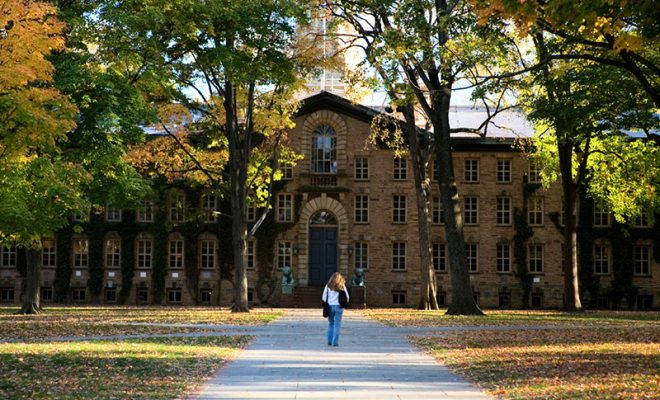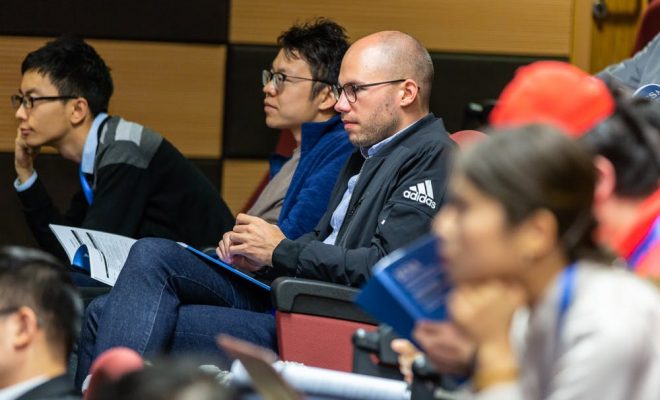2023 Best Bachelor’s Degree Programs in Computer Programming

Click here to find out more about the ranking methodology that we used to compile this list.
Congratulations! If you represent a college or university that is included in this list, please collect your seal below.
Deciding which college to attend can be a daunting task. For many, it will be the most important decision that they make in their lives. To make an informed decision, you have to consider a lot of variables, such as cost of attendance, financial aid, student-teacher ratio, academics, student life, and more. These factors will either positively or negatively impact the quality of education that you receive.
Do you want to acquire a bachelor’s degree in computer programming but don’t know what institution you should attend? Well, if you are as ambitious as I was in my late teens, then you want to attend a top school, instead of an average or mediocre one. Fortunately, we have already done the legwork for you. To help you find the right school for your interests and goals, we’ve compiled a list of 2022’s best bachelor’s in computer programming programs.
What institution did we omit from this list? Leave your suggestions in the comment section below.
- Stanford University, Stanford, CA
Stanford’s Computer Science Department was established in 1965, making it one of the oldest and most prominent programs of its kind. Undergraduates in computer science become thoroughly involved in research, working with faculty and resources that are some of the best in the world. Undergraduates in the computer science degree program can also get involved in teaching, and many employed in discussion sections for introductory classes. Other learners pursue opportunities such as internships and jobs in nearby Silicon Valley. Required coursework includes computer organization and systems, principles of computer systems, data structures and algorithms, introductory electronics, and programming abstractions.
Stanford offers learners with exemplary training for future work in the field and even hosts a special degree program called CURIS. This degree program offers top learners with research opportunities during the summer months.
- Massachusetts Institute of Technology, Cambridge, MA
Electrical engineering and computer science ae the largest bachelor’s degree programs at MIT. The program is prestigious for its academic quality and propensity toward innovation. Students learn how to solve problems in unique ways, working with modeling and abstraction methods that prepare them for success in top careers as software engineers or even bioengineers.
Each adaptable, intensive course is taught by world-class faculty. Learners are urged to take classes in concentration fields such as: applied physics; artificial intelligence; computer systems; graphics and human-computer interfaces; materials, devices, and nanotechnology; numerical methods; and signals and systems.
- Princeton University, Princeton, NJ
Princeton University not only has a foundational computer science degree program, but it also enables learners to customize their studies in interdisciplinary areas. The degree program is highly adaptable, allowing learners to major in computer science through either the AB or BSE degree program. Learners may design their programs within a broad framework and also engage in unique learning experiences such as independent study. Princeton also has a certificate degree program in applications of computing.
Learners also engage in advanced research or entrepreneurial product design, which enables them to gain experience in the core areas of computer science and their own chosen concentrations. Required coursework for the major includes compiling techniques; reasoning about computation; algorithms for computational biology; information technology and public policy; computer architecture and organization; and algorithms and data structures.
- University of California Berkley, Berkeley, CA
UC Berkeley’s Bachelor of Arts in Computer Science prepares learners for long-term research careers and for technical leadership in industry. The degree program looks beyond the technology of today. It gives learners the training necessary to anticipate future developments and to initiate those developments while still enrolled in their studies. The department also has a basic programming skills development degree program for entry-level employment, allowing learners to finish the equivalent of a minor to get some experience in the field.
Berkeley’s degree program is offered at a vibrant, diverse community in one of the most technologically influential areas of the world. The degree program has close ties to the local economy, allowing learners to investigate internships and research in concepts such as artificial intelligence, programming systems, security, communications, and many other fields.
- Yale University, New Haven, CT
Yale University offers exceptional programs, including a bachelor of science (BS) and a bachelor of arts (BA) in computer science as well as a coupled bachelor’s and master’s degree program. Yale also offers unique dual majors with the departments of electrical engineering, mathematics, and psychology. Because every degree program at Yale is grounded in the liberal arts, learners can also complete requirements for second majors such as economics or theater studies.
This computer science degree program is augmented by a variety of electives, giving learners flexibility in creating their degree pathways. Learners also have opportunities to engage in challenging original research under the guidance of a faculty member. Required classes consist of:
- Introduction to Computing and Programming
- Law, Technology, and Culture
- Introduction to Information Systems
- Mathematical Tools for Computer Science
- Intensive Algorithms
- Introduction to Systems Programming and Computer Organization
This degree program is highly cooperative, allowing learners to work with their peers in the department and other departments such as mathematics, statistics, music, business, linguistics, and more. These collaborations help the degree program to fit nicely into the diverse, academically rigorous community offered at Yale.
- California Institute of Technology, Pasadena, CA
California Institute of Technology has a computer science major that offers learners a solid footing in the mathematical and algorithmic foundations of computing. Learners obtain access to cutting-edge research in multiple sub-subjects of computer science, and also learn how to apply their comprehension of computation to other avenues. There is flexibility in course scheduling, allowing learners to engage in several tracks such as robotics, graphics, database, and more. Require coursework includes introduction to algorithms, fundamentals of computer programming, decidability and tractability, scientific fundamentals, machine learning and data mining, and distributed computing.
While most learners will engage in sufficient research during their undergraduate studies, CalTech also has unique summer undergraduate research fellowships to allow learners to get further experience. Learners may also engage in research or internships opportunities outside the institute, working at external positions that are often paid while getting vital experience. Learners even have the chance to double major, making this one of the most versatile and advanced programs of its kind.
- Harvard University, Cambridge, MA
The degree program in computer science is designed for all styles and levels of computer programmers. Most learners admitted to this degree program have little or no experience in the discipline, making it an excellent choice for young, aspiring researchers. Many computer science classes at Harvard allow for research experiences, and most learners will, at some point in their studies, work one-on-one with faculty to conduct research in all sorts of areas. Common areas of research include architecture, artificial intelligence, and theory of computation.
Learners will take an array of classes in the liberal arts. Programming languages are learned and honed within this degree program but are not the sole focus of the concentration. In addition to these core skills, required classes consist of:
- Computing Hardware
- Networks
- Data Structures and Algorithms
- Fairness, Privacy, and Validity in Data Analysis
- Computational Linguistics
- Networks Design Projects
- Artificial Intelligence
- Cryptography
Harvard offers an array of unique opportunities for learners to tailor their studies toward their interests. For example, motivated learners may pursue dual concentrations between computer science and another field, allowing them to investigate a research problem that bridges the two fields. Harvard has active learning laboratories and related machine shops, which support learners by giving them access to training and hands-on work with state-of-the-art instrumentation and advanced fabrication tools.
- Dartmouth University, Hanover, NH
The bachelor’s degree program at Dartmouth is designed not just to give learners experience in modern computation technologies such as hardware and software, but also to provide them with the tools necessary to innovate and develop exciting new technologies, both on campus and off. The degree program focuses on design, implementation, diagnosis, communication, and analysis of computers and computer-related problems.
In addition to a standard computer science bachelor’s degree program, learners may also take additional classes that will count toward a master of science degree with concentrations in digital arts or computer science. This enables talented learners to accelerate their progress toward top-rated graduate degrees.
Dartmouth is one of the few institutions to offer study abroad programs uniquely designed for computer science majors. Dartmouth learners may take coursework in concepts such as design, entrepreneurship, computer science, mathematics, and even Hungarian culture. These experiences prepare learners to work and to program in a highly diverse, rapidly changing international climate.
- Carnegie Mellon University, Pittsburgh, PA
Carnegie Mellon’s rigorous bachelor of science (BS) degree in computer science couples an in-depth core of computer science classes with substantial coursework through a required minor. Many learners pursue coursework in the humanities and other sciences, providing them the unique flexibility to engage in studies and employment in other fields. Classes are intensive and project-based and allow learners the capacity to obtain independent study credit through research.
This unparalleled degree program enables learners to conduct part-time or summer jobs in independent computer science research. These experiences help learners get insight into the issues surrounding the building and maintenance of computer-based systems. This four-year degree program is broken down into three primary components: general education, fine arts, and computer science. Learners will take an array of versatile, dynamic classes, including designing human-centered software, green computing, machine learning in practice, natural language processing, experimental animation, and computer game programming.
Carnegie Mellon encourages learners to engage in study abroad and internship opportunities to improve and broaden their interdisciplinary experiences.
- Rice University, Houston, TX
Rice University’s degree program in computer science offers learners the training and expertise necessary to solve advanced problems and design challenges in mathematics or computer science. The program is unique in that it requires zero programming or coding experience. Learners are not required to declare this as a major until after the sophomore year, allowing them to get experience in other fields before moving to field-specific and intensive coursework.
Computer science is operated through bachelor of arts or bachelor of science tracks. Learners will take classes designed to their career goals, as well as core coursework in concepts such as: principles of parallel programming, probability and statistics, elements of algorithms and computational thinking, introduction to program design, operating systems and concurrent programming, and advanced object-oriented programming and design. Learners in this degree program get experience through computer science research positions in areas such as programming languages, software engineering, algorithms, and many others.
- Georgia Institute of Technology, Atlanta, GA
The BS degree program in computer science at the Georgia Tech College of Computing prepares learners with the tools necessary to become successful at innovation and leadership in the field of computing. The degree offers flexibility and customization, allowing learners to select from eight distinct threads, consisting of media, modeling and simulation, people, intelligence, devices, and several others.
The incorporation of threads in course design offers learners with the capacity to customize their classes toward a specific field of interest or to prepare them for graduate or doctoral studies. A sample schedule might consist of coursework such as applied combinatorics, introduction to discrete math, introduction to object-oriented programming, data structures and algorithms, and computing organization and programming.
Learners have multiple opportunities to get involved outside the classroom while studying at Georgia Tech. Learner organizations are a way to hone their leadership skills. Popular organizations consist of the Big Data Club, CM Ambassadors, Entertainment Software Enthusiasts, and many others. Learners also have opportunities for internships and cooperative experiences to further develop their skills.
- Brown University, Providence, RI
Learners work to integrate computing and algorithmic thinking in other areas such as linguistics, archaeology, mathematics, medicine, and many other fields. This offers an environment that supports cross-curricular research and innovation at the undergraduate level.
Learners will take an array of classes, each built upon a collection of pathways representing distinct areas of computer science. Generally, learners will take core and sequence-based classes, choosing from concentrations such as software principles, data, or systems. A course schedule might consist of classes such as: compilers and program analysis, database management systems, design of computing systems, artificial intelligence, cryptography, and probabilistic methods.
Undergraduate learners at Brown have the capacity to engage in world-class learning experiences, both on campus and off. Learners have flown to Singapore to install software, built SMS-based commodity exchanges in Ghana, and facilitated many other interactive, relevant experiences as a result of their learning in computer science. Learners at Brown are supported by creative, pioneering faculty and a well-developed, engaging curriculum, allowing them to make a difference both during and after their undergraduate studies.
- Columbia University, New York, NY
The computer science degree program at Columbia prepares graduates for a broad range of careers in education or government by providing them with the skills necessary to become leaders in the field. On campus, learners have access to cutting-edge research laboratories and other technological resources to help advance their knowledge and practice with these facilities.
Learners will take classes within an integrated curriculum, which includes a core of eight foundational classes and seven advanced classes chosen from one of six elective tracks. A sample schedule might consist of classes in the following concepts: discrete mathematics, computer science theory, advanced programming, fundamentals of computer systems, convex optimization, approximation algorithms, and game-theoretic models of operation.
Undergraduates expand and demonstrate their learning through research opportunities and involvement in learner organizations. Popular clubs and organizations include the Association for Computing Machinery, Women in Computer Science, and the Application Development Initiative, all of which allow learners to make valuable professional connections that will help them obtain jobs when they graduate.
- Duke University, Durham, NC
Duke University has several classes of study for undergraduates interested in computer science, including a bachelor of science, a bachelor of arts, a double major with the department of electrical and computer engineering, and a minor in computer science. These programs are designed to give learners extensive hands-on experience through research, scholarship programs, and internships.
The bachelor of science degree is designed for learners who are interested in continuing their education in computer science after graduation or those who are simply interested in a rigorous approach to the field. It BS degree program offers learners training in mathematical foundations and applications as well as other interdisciplinary areas. Required classes consist of introduction to operating systems, introduction to the design and analysis of algorithms, discrete math for computer science, introductory calculus, introduction to computer science, and data structures and algorithms.
Undergraduates are given access to an array of programs outside the classroom to complement what they are learning in class. A range of faculty research projects are available, allowing learners to pursue independent study classes guided by experienced, prestigious faculty. Learners can also partake in talks, events, and other activities supported by learner organizations such as the Association for Computing Machinery’s learner chapter and the committee on Women in Computing. Duke also hosts the regional ACM learner programming contests each year.
- University of Chicago, Chicago, IL
In addition to standard bachelor of arts programs, learners may also enroll in coupled BA/MS or BS/MS degrees programs or pursue coursework in an additional field of study. A minor is also available, allowing learners to pursue work in other areas such as the social sciences, arts, or public administration. All programs require learners to take a core set of classes in mathematical sciences, physical sciences, and computer sciences. Emphasizing the importance of cooperative, hands-on learning, a sample schedule consists of classes such as computer science with applications, software construction, programming languages, game construction, discrete mathematics, and theory of algorithms.
Learners engage in an array of research collaborations with sector partners and prominent faculty. Emphasizing the importance of high-impact research, learners work with cooperative partners to research areas such as machine learning, programming languages, systems, and theory.







